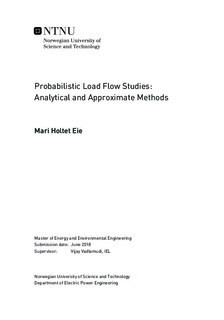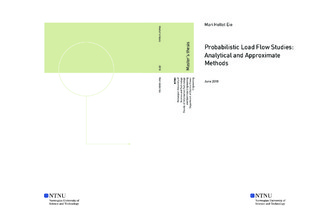| dc.description.abstract | The power system is, in an increasing manner, subject to uncertainties, and the traditional method of analyzing power systems using the deterministic load flow (DLF) is increasingly proving to be insufficient to handle the challenges of the modern power system. The modern power system is characterized by integration of renewable energy sources whose generation is fluctuating and uncontrollable in nature; even on the demand side, an increased flexibility related to the development of smart grids and power systems is expected to increase the uncertainties. Probabilistic load flow (PLF) techniques provide engineers the opportunity to include these uncertainties in the analysis of power systems.
In this thesis, a review of the current state of the PLF research is presented, with focus on analytical and approximate methods available today. Two of the most commonly used and promising methods are the Cumulant method (CM) and the Point estimate method (PEM). These methods are studied in further detail and demonstrated on three different test systems. A major contribution of this study has been to provide a pedagogical presentation of the theoretical framework and methodogical procedure, and thus one of the test cases includes thorough step-by-step illustrations of both methodologies. The aim of this master's project has also been to create in-house tools with which to conduct probabilistic load flow studies. This tool has been applied to yet another two test systems, in order to provide validation and to demonstrate the application on two test systems that are widely used in reliability studies.
The scope of this study has been the analytical and approximate methods of PLF, hence no simulation methodologies such as the Monte Carlo (MC) methods have been implemented. This has restricted the validation of the results from case studies in this thesis to comparison with results from previous research, whose availability is often limited.
The case studies of this thesis address uncertainties associated with load demand, as well as conventional and renewable generation. Correlation between different random variables in the system is an important part of these uncertainties, and is also studied in detail. Uncertainties related to outages and resulting changes in the network topology are aspects of the PLF that are not considered in this thesis, but rather left as a possibility of future work on the subject. | |

